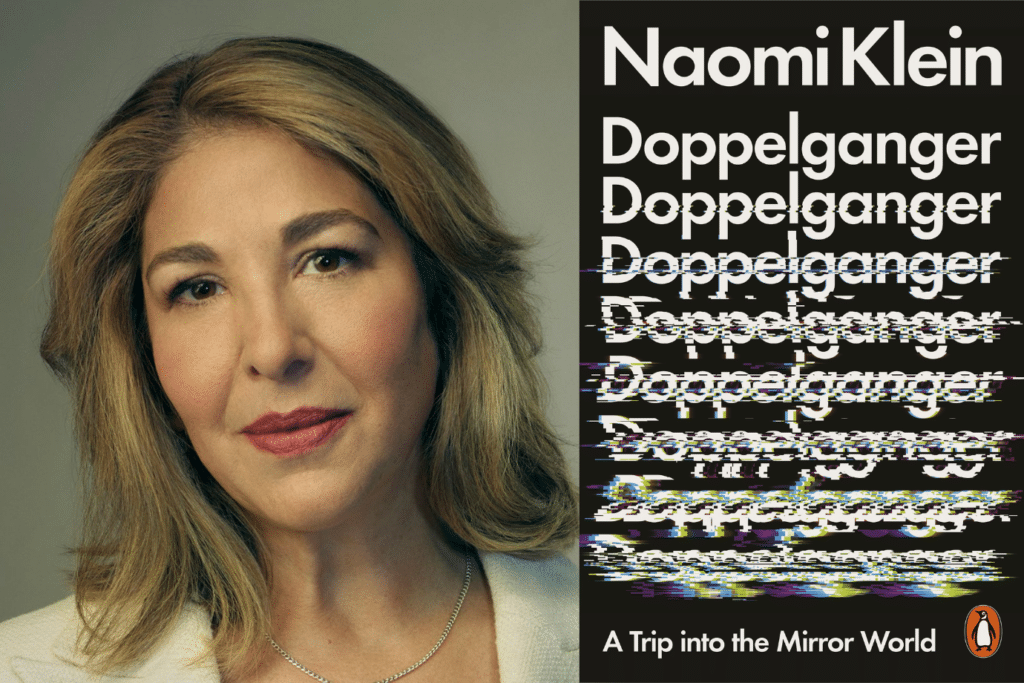Canadian writer and activist Naomi Klein has won the inaugural Women’s Prize for Non-Fiction for her book Doppelganger: A Trip Into the Mirror World.
Klein is regularly confused with the controversial US author Naomi Wolf, which is the basis for Doppelganger– what it’s like to be mistaken for somebody else.
“The book shines a light on the shadow world of social media – where facts are malleable, disinformation is prevalent and conspiracy theories abound – Klein captures the absurdities and dangers of the modern age, on a personal, social and political level,” writes the Women’s Prize judges.
“Doppelganger prompts us to rethink the moment we’re in, to reject fixed ideas about each other, and to forge a path to a more cohesive, inclusive and stable future.”
Naomi Klein vs Naomi Wolf
When Klein discovered that Wolf– a woman who shared her first name but had radically different views from her own– was getting chronically mistaken for her, she was forced to grapple with a distorted sense of reality and examine why the concept of “identity” was so unstable.
Wolf (Klein’s ‘doppelganger’) is the author of widely read feminist books like The Beauty Myth and Vagina: A New Biography as well as a familiar face on progressive news outlets such as MSNBC. And yet, she’s also widely known for being a conspiracy theorist and spreading harmful rhetoric, claiming the tyranny of public health measures and the dangers of vaccines. She once declared via Twitter that Anthony Fauci was Satan and that vaccines were a “software platform that can receive uploads”.
Despite having no ties to Wolf’s views apart from sharing the first name “Naomi”, Klein has unfortunately experienced years of online threats and hate each time Wolf would voice controversial opinions.
It was this “trip into the mirror world” that inspired Klein’s latest book, amply named Doppelganger– synonymous to a double, a person who appears so similar to another that they could easily be mistaken for them, via looks or name.
Klein’s book is described as “a deadly serious dark comedy which invites us to view our reflections in the looking glass”.
“It’s for anyone who has lost hours down an internet rabbit hole, who wonders why our politics has become so fatally warped, and who wants a way out of our collective vertigo and back to fighting for what really matters.”
Who is Naomi Klein?
Along with being the inaugural winner of the Women’s Prize for Non-Fiction, Klein is an award-winning journalist, author of nine critically acclaimed books published in over 35 languages and a Professor of Climate Justice at the University of British Columbia.
Klein’s other books include How To Change Everything: The Young Human’s Guide to Protecting the Earth and Each Other (2021), On Fire: The (Burning) Case for a Green New Deal (2019), No Is Not Enough: Resisting the New Shock Politics and Winning the World We Need (2017), This Changes Everything: Capitalism vs. The Climate (2014), The Shock Doctrine: The Rise of Disaster Capitalism (2007) and No Logo (2000). In 2018, she published The Battle for Paradise: Puerto Rico Takes On the Disaster Capitalists (2018) reprinted from her feature article for The Intercept.
In 2016 she was awarded Australia’s international award for peace, the Sydney Peace Prize for, “exposing the structural causes and responsibility for the climate crisis” and demanding “a new agenda for sharing the planet that respects human rights and equality”.
Women’s Prize
While the Women’s Prize for Non-fiction is in its first year, an award for Fiction has been ongoing for 29 years and has been won by authors including Zadie Smith, Ali Smith, Chimamanda Ngozi Adichie, Barbar Kingsolver, Susanna Clarke and Maggie O’Farrell.
The prize was set up in 1995, in the wake of an all-male Booker prize shortlist in 1991, and describes itself as “the greatest celebration of female creativity in the world”.
The awards honour work written in English by female writers from around the world and offers prize money of £30,000 (around $58,000 AUD). Organisers have said the new non-fiction prize was created to help fix the gender imbalance in the publishing world, where female representation in non-fiction prize lists are lacking.
Alongside Klein’s Doppelganger, other non-fiction titles shortlisted this year included Thunderclap: A Memoir of Art and Life and Sudden Death by Laura Cumming, A Flat Place by Noreen Masud, All That She Carried: The Journey of Ashley’s Sack, a Black Family Keepsake by Tiya Miles, Code Dependent: Living in the Shadow of AI by Madhumita Murgia and How to Say Babylon: A Jamaican Memoir by Safiya Sinclair.
This year’s Women’s Prize for Fiction went to V.V. Ganeshananthan’s Brotherless Night, a novel that follows a sixteen year old girl during a civil war in Sri Lanka, as she wants to become a doctor but gets swept up in violent political ideologies.
Australian author Kate Grenville’s Restless Dolly Maunder was shortlisted for the Fiction prize as well, making her the first Australian author ever to be shortlisted twice for this award. She won the Women’s Prize for Fiction (then called the Orange Prize) in 2001 for her novel The Idea of Perfection.



